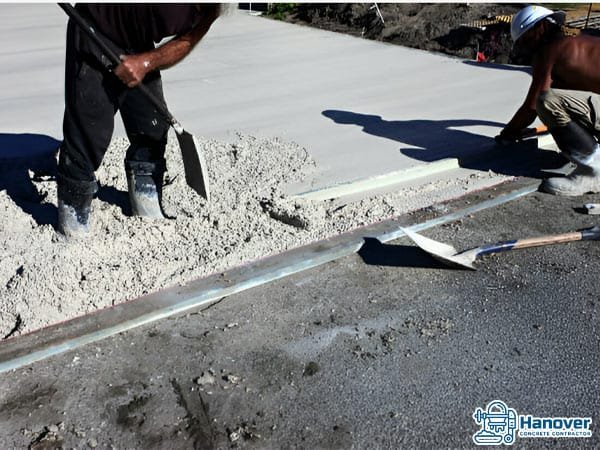When I first looked into installing a concrete driveway, I had no idea what it would cost. Some quotes seemed high, others too low—and I didn’t know what was fair.
If you’re in the same spot, this guide is for you. I’ll walk you through the real cost of concrete driveway installation so you can plan better, avoid surprises, and make wise choices.
Average Cost of Concrete Driveway Installation in 2025
Prices can change, but in 2025, most homeowners are spending between $4,000 and $8,000 to install a new concrete driveway. The cost is around $6 to $12 per square foot. This includes both materials and labor.
When I got my estimate, the contractor measured the area, checked the slope, and looked at the site. That’s because the total price depends on more than just size. Things like soil condition, driveway thickness, and design all play a role.
For a basic 2-car driveway—about 600 square feet—you might pay close to $5,000 to $7,000. If you add color, patterns, or curves, that price climbs. I’ve seen decorative driveways go up to $15 per square foot or more.
Key Factors That Affect Concrete Driveway Cost
When I priced my driveway, I saw that much more goes into the final cost than just square footage. Let me walk you through the most significant factors that change the price.

Driveway Size and Thickness
This one’s pretty simple—the bigger your driveway, the more it costs. But thickness matters, too. A standard driveway is usually 4 inches thick, which works fine for most cars. If you have a heavy vehicle or plan to park something more significant, you may need 5 to 6 inches. That adds more concrete, which means a higher price.
The cost jumped fast when I added just an extra foot of width to my driveway. So, it’s important to measure carefully and decide what you need.
Type of Concrete Used
Not all concrete is the same. I didn’t know this at first, but there are different mixes for different jobs. If you go with bare gray concrete, you’ll pay less. But if you want something that looks better—like colored, stamped, or exposed aggregate concrete—the price goes up.
I almost picked a stamped design because it looked great, but it would have added a few dollars per square foot. In the end, I stuck with plain concrete and used a good sealer to keep it looking fresh. The type of concrete you choose makes a big difference in cost.
Site Preparation and Labor Costs
Before a single drop of concrete gets poured, the site has to be ready. I learned this part can take up a big chunk of the budget. The crew might need to clear old materials, level the ground, or even dig down and add gravel for drainage.
If the soil is soft or uneven, that adds more time and cost. In my case, the ground needed extra grading, raising the price by a few hundred dollars. Labor isn’t cheap, especially if the job takes a few days. The more work your site needs, the more you’ll spend before the concrete arrives.
Finishes, Textures, and Custom Features
I wanted my driveway to look nicer than plain gray, so I asked about finish options. That’s when I saw how fast the price can climb.
A broom finish is the most basic—and the most affordable. It gives the concrete a little texture, which helps with grip. Suppose you want something more decorative, like stamped patterns, colored concrete, or exposed aggregate. In that case, you’ll pay extra for the material and the additional labor.
I loved the look of stamped concrete, but it didn’t fit my budget at the time. Still, it might be worth the cost if it matters to you.
Location and Accessibility
Where you live affects the price, too. I noticed that contractors in bigger cities often charge more than smaller towns. Depending on your area, local material costs, labor rates, and permit fees vary greatly.
Also, how easy it is to reach your driveway matters. If the crew has to haul equipment up a steep hill or through a narrow space, that can drive up labor costs. My driveway was easy to access, so I didn’t have to pay extra. But not everyone’s that lucky.
The bottom line? Location and access can change your price more than you think.
Cost Comparison: Concrete vs. Other Driveway Materials
Before I settled on concrete, I looked at other options. I wanted to ensure I got the best value—not just the lowest price.
Asphalt is usually cheaper upfront. You can install it for around $3 to $7 per square foot, but it doesn’t last as long as concrete. It also needs sealing every few years, which adds to the long-term cost.
Gravel is the cheapest. I’ve seen driveways done for as low as $1 to $3 per square foot. But gravel moves around, creates dust, and needs constant maintenance. It didn’t seem worth it for a long-term home.
Pavers look great and offer lots of design choices. But they’re the most expensive—sometimes $10 to $20 per square foot or more. I liked the look but not the price.
In the end, concrete gave me the best price, strength, and appearance balance. It wasn’t the cheapest or the fanciest, but it was solid and reliable.
Hidden or Unexpected Costs to Watch Out For
I thought I had the whole picture when I got my first estimate. But then came the surprises.
One of the most significant hidden costs was permits. In my area, I needed one to pour a new driveway, and that added a few hundred dollars. Make sure you check with your city or county before you start.
Then, the old driveway was removed. If you already have an existing surface—like asphalt or broken concrete—you’ll have to pay to tear it out and haul it away. That alone can add several hundred dollars or more.
I also didn’t think about drainage adjustments. My contractor had to fix a slope so water wouldn’t pool on the driveway. It was a small change but cost extra.
How to Budget for Your Concrete Driveway Project
When I started planning, I didn’t just look at the total cost—I broke it down. That made it easier to set a real budget and avoid going over.
I started by getting multiple estimates. This gave me a range to work with. I also asked each contractor to list out what was included. That helped me see where I might save money or where costs could sneak in.
I built a little extra—around 10%—for surprise expenses. That covered small changes or upgrades I decided on later. If you plan for a cushion, you won’t stress as much if something unexpected happens.
Finally, I looked at what I could pay in cash and what I might need to finance. Some contractors offer payment plans or take credit cards, which can help spread out the cost. A clear plan kept me on track from start to finish.
Tips to Reduce the Cost of Concrete Driveway Installation
I didn’t want to overspend, so I looked for every way to cut costs without cutting corners. Here’s what worked for me.
I kept the design simple. Straight lines and basic finishes cost less than curves or stamped patterns. I also chose standard gray concrete, which is cheaper than colored or textured options.
Timing helped too. Some contractors offer lower rates during off-peak seasons, like late fall or early spring. I asked around and got a better price by avoiding the summer rush.
I also did some of the prep myself. I cleared the space and removed old debris before the crew came. That saved time—and money.
Small steps like these can lower your total cost without hurting the quality of the job.
When to Hire a Contractor vs. DIY Considerations
I thought about doing the whole job myself. But after some research, I realized pouring a concrete driveway isn’t like a small patch job.
DIY might work if you’re fixing cracks or making a short path. But a complete driveway needs the right equipment, mix, and timing. Concrete dries fast, and one mistake can ruin the whole surface.
I chose to hire a professional because I wanted the job done right. A good contractor brings skills, experience, and tools I don’t have. It cost more, but the result was smooth, level, and built to last.
DIY could save you money if you have experience and the right tools. But if not, it’s safer—and smarter—to call in a pro.
Conclusion
Installing a concrete driveway is a big project, but planning makes it easier. Know the costs, understand the factors that affect your budget, and choose the right approach for your home. With the correct information, you can avoid surprises and make smart decisions that fit your needs and wallet.
FAQs
1. What is the average cost of concrete driveway installation?
Most homeowners spend between $4,000 and $8,000, depending on size, thickness, and design choices.
2. How much does concrete cost per square foot?
In 2025, the average cost ranges from $6 to $12 per square foot, including labor and materials.
3. What factors can raise the price of my driveway project?
Size, site prep, finishes, custom features, and location can all increase the total cost.
4. Is a concrete driveway cheaper than pavers?
Concrete is usually more affordable than pavers, costing $10 to $20 per square foot or more.
5. Can I save money by doing the driveway myself?
You can, but only if you have the tools and experience. Hiring a pro is often safer and more reliable for complete driveway installation.





